13 mrt 2012
France supports Gaza water desalination plant
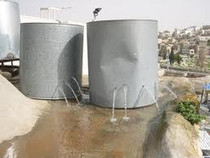
BETHLEHEM (Ma'an) -- France has pledged 10 million euros ($13.1 million) to the building of a water desalination plant in the Gaza Strip, a press statement said Tuesday.
Only 5 percent of water in Gaza is suitable for consumption, the statement from the French consulate in Jerusalem said.
The project will also allow restoration of the coastal aquifer, tackling sea pollution, it added.
Only 5 percent of water in Gaza is suitable for consumption, the statement from the French consulate in Jerusalem said.
The project will also allow restoration of the coastal aquifer, tackling sea pollution, it added.
23 feb 2012
Israeli Bulldozers Raze Land, Demolish Water-Well
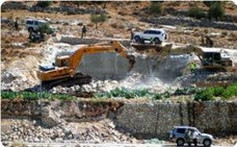
HEBRON, (WAFA) – Israeli bulldozers Thursday razed 30 dunums of Palestinian-owned cultivated land and demolished a water well in Surif, a town northwest of Hebron, according to official sources.
Surif mayor Mousa al-Sha’er told WAFA that Israeli bulldozers accompanied with soldiers razed 30 dunums, demolished a water well and uprooted more than 750 productive trees including almond and olive trees.
Israeli forces claimed that the land was state-owned despite the fact that it is included within the structural plan of the town, added Sha’er.
Surif mayor Mousa al-Sha’er told WAFA that Israeli bulldozers accompanied with soldiers razed 30 dunums, demolished a water well and uprooted more than 750 productive trees including almond and olive trees.
Israeli forces claimed that the land was state-owned despite the fact that it is included within the structural plan of the town, added Sha’er.
20 feb 2012
Gaza's energy crisis threatens hospitals, water supply
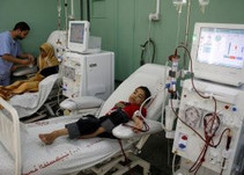
GAZA CITY (IRIN) -- An energy crisis is currently hitting the Gaza Strip's public services hard and could lead to a severe humanitarian crisis if a sustainable solution is not found soon.
"If the power plant does not resume its work in the next days, some hospitals will be left without electricity," Mahmud Daher, officer-in-charge of the World Health Organization in Gaza, told IRIN.
Gaza's only power plant was forced to shut down on Tuesday due to a lack of fuel, which has previously been imported in amounts of up to one million liters a day from Egypt.
"The current crisis is a political problem that started six years ago. The Israeli occupation, the Palestinian Authority's refusal to provide the Gaza Strip with funds, and the policy of Egypt which is dealing with Gaza out of security calculations, have all contributed to the current situation," said Hamas government spokesman Fawzi Barhoum.
"(Gaza Prime Minister) Ismail Haniyeh is in Egypt at the moment to discuss the crisis and to find a quick solution. But so far no progress has been made. The whole of Gaza has been without electricity since last night," he added.
Since the power plant stopped working, public hospitals and clinics have been running on only 20 percent of the 440,000 liters of fuel usually needed per day to supply the health system with electricity, Daher said, adding: "Some hospitals might withstand the crisis for one more week, some others no more than one or two days."
Some fuel entered the Gaza Strip over on Saturday and Sunday via a tunnel from Egypt, but the amount was not sufficient for resumption of operations at the power plant, which requires more than 400,000 liters of diesel a day, and produces 80-85 megawatts.
The Gaza Strip also receives around 120 MW of electricity from Israel. With the power plant shut down, the overall electricity deficit has reached more than 60 percent of normal supply.
A threat to the most vulnerable
Hassan Khalaf, Gaza's deputy health minister, said Gaza had only had six hours of electricity a day for the past two weeks. "The nurseries, the ICUs (intensive care units), the operation rooms are all severely affected by that. The crisis is becoming a danger for the most vulnerable."
Among the hospitals most severely affected is Shifa, which is the largest medical complex in the Gaza Strip. According to an as yet unpublished report by WHO, it had fuel for only 54 hours of full operation at the end of last week.
Equally, the al-Aqsa hospital and the Psychiatric hospital are at high risk, with less than 50 hours of fuel supply left as of Thursday.
"Theoretically, we could reach point zero at any time soon," Daher warned, adding: "In the worst case, the crisis could lead to a stop in vital services for about 100 newborn children, could endanger about 60 people currently in intensive care and about 400 patients who are dependent on life-saving dialysis."
In addition, non-urgent operations will have to be canceled, and laboratory services, the kitchen and laundry services might be affected.
Critical elements such as intensive care units have a double back-up system of large Uninterruptible Power Supply generators.
But they can only function for short periods, while the main hospital generators are meant to supply electricity for long-term use. Many of the generators are not suitable for constant use and need frequent repair or replacement.
The situation in hospitals has also been worsened by an unusually cold winter, which has increased energy demand. Forced to reset priorities, many hospitals have refrained from heating.
Only the heating systems in stations with newborn children and immune-compromised and elderly patients, who are at risk of hypothermia, have remained intact.
Water pumps not working
The lack of electricity has also affected water supplies.
"Water pumps have lost 40 percent of their capacity to transport water into the wells," Omar Shatat, technical manager at the Gaza Strip's Coastal Municipalities Water Utility, told IRIN.
Before the power plant closed down, pumps delivered about 220,000 liters of water a day. "Now there are hardly able to pump 150,000 per day", he said.
The situation is further worsened by the 12-18 hour electricity cuts households in the Gaza Strip currently face.
Most households use water pumped by CMWU into tanks. But in order to retrieve the water from there, another pump is needed. "Because they don't have electricity, the water cannot be delivered into their homes", Shatat explained.
For now at least, drinking water could be supplied to the entire population. "But if things continue for another three or four days, we could also face a serious problem here," he added.
Unreliable supply
The Gaza Strip began to import fuel from Egypt through underground tunnels after Israel imposed a tight blockade on the Strip in mid-2007, including heavy restrictions on the movement of goods.
"This blockade made us depend on Egyptian fuel for the last years. But the Gaza Strip's reliance on this single source was a solution of a very complex problem, created by the interruption of Israeli fuel supply in 2009," Ahmad Abu al-Amreen, director of public relations at the Gaza Energy Authority, told IRIN.
Despite the partial easing of Israel's blockade in June 2010, the underground tunnels between Egypt and the Gaza Strip continued to serve as the main channel for importing fuel at a price significantly cheaper than that imported from Israel.
In the weeks prior to the shutdown of the Gaza Power Plant on Tuesday, the level of fuel supplied through the Rafah tunnels from Egypt to the Gaza Strip has declined gradually, falling to on average 100-150,000 liters per day, or 20 percent of the daily amount of fuel that entered into Gaza in the previous weeks, says a report by the Office for the Coordination of Humanitarian Affairs.
The exact reasons for the decline remain unclear. But "there are reportedly distribution problems affecting fuel in Egypt, as well as other issues, which are impeding deliveries to the border with Gaza," the report explains.
"People are very frustrated. They have a government that cares little and puts responsibility on the shoulders of everyone else but not on itself. The current crisis was created through dependence on unreliable tunnels, a system in danger of collapsing at any time," a humanitarian aid worker from Gaza, who asked to remain anonymous, told IRIN.
"If the power plant does not resume its work in the next days, some hospitals will be left without electricity," Mahmud Daher, officer-in-charge of the World Health Organization in Gaza, told IRIN.
Gaza's only power plant was forced to shut down on Tuesday due to a lack of fuel, which has previously been imported in amounts of up to one million liters a day from Egypt.
"The current crisis is a political problem that started six years ago. The Israeli occupation, the Palestinian Authority's refusal to provide the Gaza Strip with funds, and the policy of Egypt which is dealing with Gaza out of security calculations, have all contributed to the current situation," said Hamas government spokesman Fawzi Barhoum.
"(Gaza Prime Minister) Ismail Haniyeh is in Egypt at the moment to discuss the crisis and to find a quick solution. But so far no progress has been made. The whole of Gaza has been without electricity since last night," he added.
Since the power plant stopped working, public hospitals and clinics have been running on only 20 percent of the 440,000 liters of fuel usually needed per day to supply the health system with electricity, Daher said, adding: "Some hospitals might withstand the crisis for one more week, some others no more than one or two days."
Some fuel entered the Gaza Strip over on Saturday and Sunday via a tunnel from Egypt, but the amount was not sufficient for resumption of operations at the power plant, which requires more than 400,000 liters of diesel a day, and produces 80-85 megawatts.
The Gaza Strip also receives around 120 MW of electricity from Israel. With the power plant shut down, the overall electricity deficit has reached more than 60 percent of normal supply.
A threat to the most vulnerable
Hassan Khalaf, Gaza's deputy health minister, said Gaza had only had six hours of electricity a day for the past two weeks. "The nurseries, the ICUs (intensive care units), the operation rooms are all severely affected by that. The crisis is becoming a danger for the most vulnerable."
Among the hospitals most severely affected is Shifa, which is the largest medical complex in the Gaza Strip. According to an as yet unpublished report by WHO, it had fuel for only 54 hours of full operation at the end of last week.
Equally, the al-Aqsa hospital and the Psychiatric hospital are at high risk, with less than 50 hours of fuel supply left as of Thursday.
"Theoretically, we could reach point zero at any time soon," Daher warned, adding: "In the worst case, the crisis could lead to a stop in vital services for about 100 newborn children, could endanger about 60 people currently in intensive care and about 400 patients who are dependent on life-saving dialysis."
In addition, non-urgent operations will have to be canceled, and laboratory services, the kitchen and laundry services might be affected.
Critical elements such as intensive care units have a double back-up system of large Uninterruptible Power Supply generators.
But they can only function for short periods, while the main hospital generators are meant to supply electricity for long-term use. Many of the generators are not suitable for constant use and need frequent repair or replacement.
The situation in hospitals has also been worsened by an unusually cold winter, which has increased energy demand. Forced to reset priorities, many hospitals have refrained from heating.
Only the heating systems in stations with newborn children and immune-compromised and elderly patients, who are at risk of hypothermia, have remained intact.
Water pumps not working
The lack of electricity has also affected water supplies.
"Water pumps have lost 40 percent of their capacity to transport water into the wells," Omar Shatat, technical manager at the Gaza Strip's Coastal Municipalities Water Utility, told IRIN.
Before the power plant closed down, pumps delivered about 220,000 liters of water a day. "Now there are hardly able to pump 150,000 per day", he said.
The situation is further worsened by the 12-18 hour electricity cuts households in the Gaza Strip currently face.
Most households use water pumped by CMWU into tanks. But in order to retrieve the water from there, another pump is needed. "Because they don't have electricity, the water cannot be delivered into their homes", Shatat explained.
For now at least, drinking water could be supplied to the entire population. "But if things continue for another three or four days, we could also face a serious problem here," he added.
Unreliable supply
The Gaza Strip began to import fuel from Egypt through underground tunnels after Israel imposed a tight blockade on the Strip in mid-2007, including heavy restrictions on the movement of goods.
"This blockade made us depend on Egyptian fuel for the last years. But the Gaza Strip's reliance on this single source was a solution of a very complex problem, created by the interruption of Israeli fuel supply in 2009," Ahmad Abu al-Amreen, director of public relations at the Gaza Energy Authority, told IRIN.
Despite the partial easing of Israel's blockade in June 2010, the underground tunnels between Egypt and the Gaza Strip continued to serve as the main channel for importing fuel at a price significantly cheaper than that imported from Israel.
In the weeks prior to the shutdown of the Gaza Power Plant on Tuesday, the level of fuel supplied through the Rafah tunnels from Egypt to the Gaza Strip has declined gradually, falling to on average 100-150,000 liters per day, or 20 percent of the daily amount of fuel that entered into Gaza in the previous weeks, says a report by the Office for the Coordination of Humanitarian Affairs.
The exact reasons for the decline remain unclear. But "there are reportedly distribution problems affecting fuel in Egypt, as well as other issues, which are impeding deliveries to the border with Gaza," the report explains.
"People are very frustrated. They have a government that cares little and puts responsibility on the shoulders of everyone else but not on itself. The current crisis was created through dependence on unreliable tunnels, a system in danger of collapsing at any time," a humanitarian aid worker from Gaza, who asked to remain anonymous, told IRIN.
15 feb 2012
Israeli army destroys West Bank well restored by Polish charity – Israeli envoy summoned by Warsaw
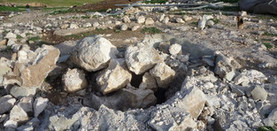
Israel’s ambassador was summoned by the Foreign Ministry in Warsaw, to explain why Israeli forces demolished an ancient water well in the West Bank, restored by a Polish charity.
Deputy foreign minister Jerzy Pomianowski told Polish Radio that the ministry asked Ambassador Zvi Rav-Nera to explain, Tuesday, why the damage occurred to restoration work done by the Polish Humanitarian Action charity in the village of El Rahawia as Israeli forces cleared what they say is an illegal settlement in the southern Hebron mountains.
“I invited the Israeli ambassador in to express our concern over the actions of the Israeli authorities in the West Bank related directly to the destruction of a well rebuilt by Polish Humanitarian Action with funds from the Polish foreign ministry,” the minister said.
Israeli army bulldozers also demolished much of the small Palestinian village, which is situated in the Area C district of the West Bank, which is under direct Israeli control.
“In the morning I received a text message about demolition of the village,” Marta Kaszubska coordinator of the Polish Humanitarian Action (PAH) mission in Jerusalem told the Onet.pl web site.
“I immediately went to the place. El Rahawia was razed to the ground […] leaving only three tents. I met people who lost their possessions – their entire lives,” she added.
Eighty three people, including 48 children, were made homeless by the Israeli army raid.
According to Israelis, the Polish charity had no legal permission from the Israeli administration on the occupied territories to carry out the project.
Deputy foreign minister Jerzy Pomianowski told the Israeli ambassador yesterday that even though the situation in the West Bank is very complex in the light of international law, in view of the friendly relations between Poland and Israel all problems should be resolved at the conference table.
The Israeli diplomat is said to have pledged to provide additional information on the army operation.
Israeli forces have repeatedly broken up villages, often little more than groups of makeshift tents with some buildings, as they had not obtained planning permission from the authorities to build there.
Polish Humanitarian Action says the wells and water tanks are needed by the villagers, as before the restoration, the locals had to buy the water at high prices from the Israelis.
Illegal settlement?
Miss Sarit Michaeli, a spokesperson for Betselem, an Israeli Human Rights Organization, has told thenews.pl, however: “The current situation is that the civic authorities in Area C rarely issue new building permits to the Palestinians who live there. We believe that it is possible for Israel to have a policy which protects Israeli security interests as well as those of the local population living there.”
Meanwhile, Major Guy Inbar, an Israeli army spokesman for the civil administration of the Area C area tells us that the villagers were given the chance to submit planning applications for the wells and other buildings.
“All the wells that were destroyed were built illegally,” he told us.
“This was done after the inhabitants were given the chance to present their claims to the relevant committee and refused to do so. After that they were asked to remove the tents and buildings themselves and but refused. Only then did the Israeli security forces take action. We regret that those responsible for the well did not build it legally after getting all the needed permits as other international aid organizations have done.”
The French Foreign Affairs Committee published a report in January accusing Israel of discrimination against Palestinians in the area, particularly of systematically destroying wells and cisterns and denying locals access to water. “Approximately 450,000 Israeli settlers in the West Bank consume more water than the 2.3 million Palestinians living there,” highlights the report.
The French identified the Israeli actions as “apartheid”. (pg)
Reporting by Peter Gentle and Hagay Hacohen
Gaza Water Authority: Water continues to be broken off in the event of power failure.
Warned CMWU they can not deliver water to citizens in quantities suitable if the crisis continued power outages.
The bureau said in a statement: "continuing crisis of power cuts lead to the inability of stakeholders to deliver water to citizens in quantities suitable as lead to the consumption of very large amounts of fuel to ensure that the facilities of water supply works around the clock, which leads to the depletion of financial resources for the benefit of" .
She added that although the work of interest, permanent operation of wells and pumping stations during periods of power outages, but this does not solve the problem completely because of lack of compatibility between the schedules of water distribution and tables of electricity in different areas in the event of power outages for long hours with commitment pumping water in conjunction with the presence of electricity, leading to increased time required for water supply areas and thus to delay the distribution of water supply program.
Deputy foreign minister Jerzy Pomianowski told Polish Radio that the ministry asked Ambassador Zvi Rav-Nera to explain, Tuesday, why the damage occurred to restoration work done by the Polish Humanitarian Action charity in the village of El Rahawia as Israeli forces cleared what they say is an illegal settlement in the southern Hebron mountains.
“I invited the Israeli ambassador in to express our concern over the actions of the Israeli authorities in the West Bank related directly to the destruction of a well rebuilt by Polish Humanitarian Action with funds from the Polish foreign ministry,” the minister said.
Israeli army bulldozers also demolished much of the small Palestinian village, which is situated in the Area C district of the West Bank, which is under direct Israeli control.
“In the morning I received a text message about demolition of the village,” Marta Kaszubska coordinator of the Polish Humanitarian Action (PAH) mission in Jerusalem told the Onet.pl web site.
“I immediately went to the place. El Rahawia was razed to the ground […] leaving only three tents. I met people who lost their possessions – their entire lives,” she added.
Eighty three people, including 48 children, were made homeless by the Israeli army raid.
According to Israelis, the Polish charity had no legal permission from the Israeli administration on the occupied territories to carry out the project.
Deputy foreign minister Jerzy Pomianowski told the Israeli ambassador yesterday that even though the situation in the West Bank is very complex in the light of international law, in view of the friendly relations between Poland and Israel all problems should be resolved at the conference table.
The Israeli diplomat is said to have pledged to provide additional information on the army operation.
Israeli forces have repeatedly broken up villages, often little more than groups of makeshift tents with some buildings, as they had not obtained planning permission from the authorities to build there.
Polish Humanitarian Action says the wells and water tanks are needed by the villagers, as before the restoration, the locals had to buy the water at high prices from the Israelis.
Illegal settlement?
Miss Sarit Michaeli, a spokesperson for Betselem, an Israeli Human Rights Organization, has told thenews.pl, however: “The current situation is that the civic authorities in Area C rarely issue new building permits to the Palestinians who live there. We believe that it is possible for Israel to have a policy which protects Israeli security interests as well as those of the local population living there.”
Meanwhile, Major Guy Inbar, an Israeli army spokesman for the civil administration of the Area C area tells us that the villagers were given the chance to submit planning applications for the wells and other buildings.
“All the wells that were destroyed were built illegally,” he told us.
“This was done after the inhabitants were given the chance to present their claims to the relevant committee and refused to do so. After that they were asked to remove the tents and buildings themselves and but refused. Only then did the Israeli security forces take action. We regret that those responsible for the well did not build it legally after getting all the needed permits as other international aid organizations have done.”
The French Foreign Affairs Committee published a report in January accusing Israel of discrimination against Palestinians in the area, particularly of systematically destroying wells and cisterns and denying locals access to water. “Approximately 450,000 Israeli settlers in the West Bank consume more water than the 2.3 million Palestinians living there,” highlights the report.
The French identified the Israeli actions as “apartheid”. (pg)
Reporting by Peter Gentle and Hagay Hacohen
Gaza Water Authority: Water continues to be broken off in the event of power failure.
Warned CMWU they can not deliver water to citizens in quantities suitable if the crisis continued power outages.
The bureau said in a statement: "continuing crisis of power cuts lead to the inability of stakeholders to deliver water to citizens in quantities suitable as lead to the consumption of very large amounts of fuel to ensure that the facilities of water supply works around the clock, which leads to the depletion of financial resources for the benefit of" .
She added that although the work of interest, permanent operation of wells and pumping stations during periods of power outages, but this does not solve the problem completely because of lack of compatibility between the schedules of water distribution and tables of electricity in different areas in the event of power outages for long hours with commitment pumping water in conjunction with the presence of electricity, leading to increased time required for water supply areas and thus to delay the distribution of water supply program.
9 feb 2012
Palestine, France Discuss Preparations for Water Forum
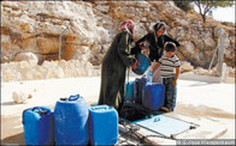
JERUSALEM, (WAFA) – Head of the Palestinian Water Authority Shaddad Attili and French Minister Henri de Raincourt Thursday discussed ways of cooperation between the two countries and preparations for the water forum.
Spokesman of the French Ministry of Foreign Affairs Bernard Valero said, in a statement issued by the Consulate General of France in Jerusalem, that the two ministers discussed necessary steps needed to implement the right to access water in Palestine.
De Raincourt welcomed Palestine’s constructive participation to prepare for the forum held in Marseille in March.
He affirmed the importance of implementing the UN Convention on International Water Resources and Integrated Water Management of 1997 as soon as possible.
De Raincourt welcomed the start of the proposed desalination project in Gaza, which aims to provide drinking water to 1.6 million Palestinians.
Spokesman of the French Ministry of Foreign Affairs Bernard Valero said, in a statement issued by the Consulate General of France in Jerusalem, that the two ministers discussed necessary steps needed to implement the right to access water in Palestine.
De Raincourt welcomed Palestine’s constructive participation to prepare for the forum held in Marseille in March.
He affirmed the importance of implementing the UN Convention on International Water Resources and Integrated Water Management of 1997 as soon as possible.
De Raincourt welcomed the start of the proposed desalination project in Gaza, which aims to provide drinking water to 1.6 million Palestinians.
26 feb 2012
Israeli Authorities Tell Palestinian his House will be Demolished
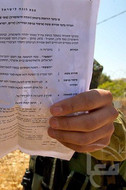
JENIN, (WAFA) – The Israeli military authorities Thursday informed a Palestinian from Ya’bad, a village southwest of the northern West Bank city of Jenin, that the house he was building will be demolished, according to the house owner.
Othman Abu Obaid told WAFA that the planning department of the Israeli military authorities handed him a notice to stop the construction work on his 130 square meter house, which is adjacent to Mabo Dotan, a Jewish settlement built on Ya’bad land, under the pretext the house was located in area C, which is under full Israeli control.
They also handed him a notice to demolish a 60-cubic-meter water tank, which was built with a Norwegian fund.
Othman Abu Obaid told WAFA that the planning department of the Israeli military authorities handed him a notice to stop the construction work on his 130 square meter house, which is adjacent to Mabo Dotan, a Jewish settlement built on Ya’bad land, under the pretext the house was located in area C, which is under full Israeli control.
They also handed him a notice to demolish a 60-cubic-meter water tank, which was built with a Norwegian fund.
23 jan 2012
PA, France Sign €10m Water Supply Agreement
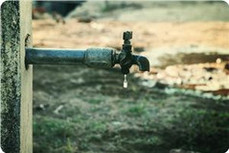
HEBRON, (WAFA) – Prime Minister Salam Fayyad Monday signed with the French Minister for Cooperation, Henri De Raincourt, a €10 million water supply agreement, according to a press release by Fayyad’s office.
The agreement, signed during the Palestinian-French Municipalities Conference in Hebron, aims to enhance the water service for more than 150,000 residents in the West Bank, said the release.
Fayyad informed the French minister of the recent developments in the Palestinian Territory and the challenges before the Palestinian Authority to strengthen the readiness for an independent Palestinian state.
Fayyad praised the French support, which enables PA to uphold its responsibilities towards Palestinians and continue working on the state readiness, as well as he welcomed the French people solidarity with the Palestinians.
The Prime Minister also praised the European Union position against the Israeli practices in the occupied East Jerusalem and stressed the importance of the taking immediate measures to put into practice its position.
The agreement, signed during the Palestinian-French Municipalities Conference in Hebron, aims to enhance the water service for more than 150,000 residents in the West Bank, said the release.
Fayyad informed the French minister of the recent developments in the Palestinian Territory and the challenges before the Palestinian Authority to strengthen the readiness for an independent Palestinian state.
Fayyad praised the French support, which enables PA to uphold its responsibilities towards Palestinians and continue working on the state readiness, as well as he welcomed the French people solidarity with the Palestinians.
The Prime Minister also praised the European Union position against the Israeli practices in the occupied East Jerusalem and stressed the importance of the taking immediate measures to put into practice its position.
22 jan 2012
Israeli Forces Hand Palestinians Evacuation Notices near Nablus
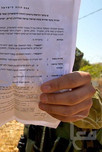
NABLUS, (WAFA) – Israeli forces Sunday handed two Palestinians from Joreish village, south of Nablus notices to evacuate their land and demolish water wells, according to local sources.
Ghassan Daghlas, in charge of the settlements file at the Palestinian Authority in the northern part of the West Bank, said that Israeli soldiers gave the village’s residents 45 day notice to demolish the wells and evacuate the land.
He pointed out that Israeli soldiers continue to hand Palestinians notices in a number of villages south of Nablus and in the Jordan Valley area.
Ghassan Daghlas, in charge of the settlements file at the Palestinian Authority in the northern part of the West Bank, said that Israeli soldiers gave the village’s residents 45 day notice to demolish the wells and evacuate the land.
He pointed out that Israeli soldiers continue to hand Palestinians notices in a number of villages south of Nablus and in the Jordan Valley area.
18 jan 2012
PWA chief: World must act on Israel's water apartheid
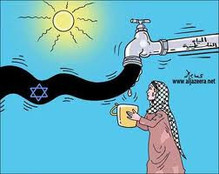
BETHLEHEM (Ma'an) -- The head of the Palestinian Water Authority on Tuesday said the international community must act on Israel's "apartheid" water policy in the West Bank.
In January, the French parliament's Foreign Affairs Committee issued a report which found that Israel's water policy constituted "a weapon serving the new apartheid." It noted that Jewish settlers used more than five times as much water as Palestinians and were given priority during droughts.
PWA chief Shaddad Attili said the World Bank, the UN and other international organizations had issued similar reports on Israel's denial of Palestinian water rights.
Growing awareness must be translated into international pressure on Israel to end its water apartheid, Attili said in a statement.
"Israel controls all the water resources in the occupied West Bank. It exploits these resources for near exclusive Israeli use, allocating a mere fraction of the available water supply to Palestinians. While Israelis enjoy some of the highest water consumption rates in the world, Palestinians continue to face a series of crippling water shortages artificially engineered by Israel as a matter of policy," Attili said.
The official added that Israel used water to target vulnerable Palestinian communities.
"This includes its systematic demolition of Palestinian rainwater harvesting cisterns and wells used as a means to forcibly displace Palestinian communities who depend on them for their basic water needs. The number of demolitions continues to increase, with at least 25 Palestinian wells and 32 Palestinian cisterns demolished in 2011 alone.”
Negotiations to resolve the allocation of water have failed, he said, adding that the Joint Water Committee established in the Oslo Accords effectively gave Israel veto power over all Palestinian water projects.
Water is one of the six final-status issues to be resolved in a peace agreement, alongside settlements, refugees, borders, security and Jerusalem.
"Without water, and without ensuring Palestinian water rights, there can be no viable or sovereign Palestinian state," Attili warned.
In January, the French parliament's Foreign Affairs Committee issued a report which found that Israel's water policy constituted "a weapon serving the new apartheid." It noted that Jewish settlers used more than five times as much water as Palestinians and were given priority during droughts.
PWA chief Shaddad Attili said the World Bank, the UN and other international organizations had issued similar reports on Israel's denial of Palestinian water rights.
Growing awareness must be translated into international pressure on Israel to end its water apartheid, Attili said in a statement.
"Israel controls all the water resources in the occupied West Bank. It exploits these resources for near exclusive Israeli use, allocating a mere fraction of the available water supply to Palestinians. While Israelis enjoy some of the highest water consumption rates in the world, Palestinians continue to face a series of crippling water shortages artificially engineered by Israel as a matter of policy," Attili said.
The official added that Israel used water to target vulnerable Palestinian communities.
"This includes its systematic demolition of Palestinian rainwater harvesting cisterns and wells used as a means to forcibly displace Palestinian communities who depend on them for their basic water needs. The number of demolitions continues to increase, with at least 25 Palestinian wells and 32 Palestinian cisterns demolished in 2011 alone.”
Negotiations to resolve the allocation of water have failed, he said, adding that the Joint Water Committee established in the Oslo Accords effectively gave Israel veto power over all Palestinian water projects.
Water is one of the six final-status issues to be resolved in a peace agreement, alongside settlements, refugees, borders, security and Jerusalem.
"Without water, and without ensuring Palestinian water rights, there can be no viable or sovereign Palestinian state," Attili warned.
17 jan 2012
French parliament report accuses Israel of water 'apartheid' in West Bank
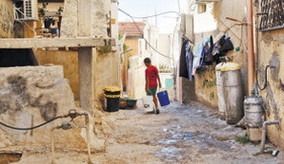
A man collecting drinking water in buckets in Jisr al-Zarqa.
Foreign Affairs Committee report, which was published two week ago, and thus did not refute it or work to moderate it.
The French parliament's Foreign Affairs Committee published an unprecedented report two weeks ago accusing Israel of implementing "apartheid" policies in its allocation of water resources in the West Bank.
Israeli Embassy in Paris had no foreknowledge of the French parliament's
The Israeli Embassy in Paris had no foreknowledge of the report and thus did not refute it or work to moderate it. Foreign Ministry officials called the incident "a serious diplomatic mishap."
The report said that water has become "a weapon serving the new apartheid" and gave examples and statistics that ostensibly back this claim.
"Some 450,000 Israeli settlers on the West Bank use more water than the 2.3 million Palestinians that live there," the report said. "In times of drought, in contravention of international law, the settlers get priority for water."
The author of the report was Socialist Party MP Jean Glavany, who in the past served as agriculture minister under French President Lionel Jospin and as cabinet secretary for President Francois Mitterrand.
The Foreign Affairs Committee had assigned Glavany to report on the geopolitical impact of water in confrontation zones throughout the world. He visited Israel and the Palestinian territories on May 17-19 of last year and met with several senior government officials, including Energy and Water Resources Minister Uzi Landau and Water Commissioner Uri Shani.
Both the Foreign Ministry and the embassy in Paris were aware of the visit and knew that Glavany planned to write a report. But Israeli Ambassador to France Yossi Gal did not follow up on Glavany's work.
No one in the embassy attempted to get a draft copy of the report so as to ensure that its conclusions were not overly harsh. Nor were Israel's allies on the French Foreign Affairs Committee contacted to ascertain whether the report could be moderated.
The embassy only learned about the report a few days after it appeared on the French parliament's website, when the Foreign Ministry's European desk in Jerusalem, which heard about it from an outside source, informed the embassy.
The report states that water is not allocated fairly to West Bank Palestinians and that Palestinians have no access to the territory's underground aquifers. Glavany said Israel was perpetrating a "water occupation" against the Palestinians.
"Israel's territorial expansion is seen as a 'water occupation' of both streams and aquifers," the report said.
It also said that "the separation wall being built by Israel allows it to control access to underground water sources" and to "direct the flow of water westward."
The report accused Israel of "systematically destroying wells that were dug by Palestinians on the West Bank," as well as of deliberately bombing reservoirs in the Gaza Strip in 2008-09. It also claimed that "Many water purification facilities planned by the Palestinian Water Ministry are being 'blocked' by the Israeli administration."
Senior Foreign Ministry officials said the Paris embassy had been asleep at the switch.
"This report is a serious mishap that has caused diplomatic damage and has seriously damaged Israel's image in France," one senior official said.
Foreign Ministry spokesman Yigal Palmor said Glavany had inserted extreme terms into the report on his own, at the last minute, without consulting other members of the report's working group.
"These unacceptable remarks surprised his colleagues in the working group, who were shocked to find them in the final version after it was published, after Israeli diplomats called their attention to them," Palmor said.
The report, he continued, "was loaded with the language of vicious propaganda, far removed from any professional criticism with which one could argue intelligently." Moreover, the report's author omitted numerous facts and acted "with blatant tendentiousness."
"After embassy staffers pointed out the exceptional seriousness of the wording ... all the working group members disassociated themselves from [the report], including the chairman, who sent an official letter to the ambassador renouncing responsibility for the report's anti-Israel expressions," Palmor added.
Head of Water Authority Welcomes French Report on Israel’s “Water Apartheid”
RAMALLAH, (WAFA) - Head of the Palestinian Water Authority (PWA), Shaddad Attili, welcomed the report produced by the French parliament's Foreign Affairs Committee, describing Israel’s water policies in the occupied Palestinian Territory as a form of apartheid, Tuesday said a press release by PWA.
It said that a recent report by the French Parliament critical of Israel’s discriminatory water policies and practices in the occupied Palestinian Territory should put the international community on note regarding the acute water crisis facing Palestinians,
“This report by the French Parliament clearly highlights water as a major target of Israel’s occupation. It implicates water in the politics of occupation, and draws attention to the different ways in which Israel’s discriminatory water policies and practices in the occupied Palestinian territory constitute a form of water apartheid,” Attili said.
He added, “This is not the first report to focus on the impact of Israel’s occupation and its systematic denial of basic Palestinian water rights. There are many other reports in circulation, produced by the World Bank, the UN and various international NGO’s, which paint a similar picture in the occupied Palestinian Territory.”
Attili said that growing awareness of Israel’s discriminatory water policies needed to be translated into international pressure on Israel to end its water apartheid in the occupied Palestinian territory.
“Israel controls all the water resources in the occupied West Bank. It exploits these resources for near exclusive Israeli use, allocating a mere fraction of the available water supply to Palestinians. While Israelis enjoy some of the highest water consumption rates in the world, Palestinians continue to face a series of crippling water shortages artificially engineered by Israel as a matter of policy,” Attili added.
He said: “Israel denies Palestinians their rightful share of water. It also uses water as a weapon to target vulnerable Palestinian communities. This includes its systematic demolition of Palestinian rainwater harvesting cisterns and wells used as a means to forcibly displace Palestinian communities who depend on them for their basic water needs.' ' The number of demolitions continues to increase, with at least 25 Palestinian wells and 32 Palestinian cisterns demolished in 2011 alone.”
“The situation on the ground speaks for itself, no matter how much the government of Israel tries to put a different spin on it. The international community has a moral and legal imperative to change this situation.”
Attili concluded by reinforcing the importance of water in efforts to achieve peace: “Palestinians need to be able to access and control our rightful share of water in accordance with international law. The Oslo Accords did not achieve this, while the Joint Water Committee has mainly served to reinforce the status quo of occupation by giving Israel effective veto power over all Palestinian water projects.”
“Without water, and without ensuring Palestinian water rights, there can be no viable or sovereign Palestinian state,” he said.
Foreign Affairs Committee report, which was published two week ago, and thus did not refute it or work to moderate it.
The French parliament's Foreign Affairs Committee published an unprecedented report two weeks ago accusing Israel of implementing "apartheid" policies in its allocation of water resources in the West Bank.
Israeli Embassy in Paris had no foreknowledge of the French parliament's
The Israeli Embassy in Paris had no foreknowledge of the report and thus did not refute it or work to moderate it. Foreign Ministry officials called the incident "a serious diplomatic mishap."
The report said that water has become "a weapon serving the new apartheid" and gave examples and statistics that ostensibly back this claim.
"Some 450,000 Israeli settlers on the West Bank use more water than the 2.3 million Palestinians that live there," the report said. "In times of drought, in contravention of international law, the settlers get priority for water."
The author of the report was Socialist Party MP Jean Glavany, who in the past served as agriculture minister under French President Lionel Jospin and as cabinet secretary for President Francois Mitterrand.
The Foreign Affairs Committee had assigned Glavany to report on the geopolitical impact of water in confrontation zones throughout the world. He visited Israel and the Palestinian territories on May 17-19 of last year and met with several senior government officials, including Energy and Water Resources Minister Uzi Landau and Water Commissioner Uri Shani.
Both the Foreign Ministry and the embassy in Paris were aware of the visit and knew that Glavany planned to write a report. But Israeli Ambassador to France Yossi Gal did not follow up on Glavany's work.
No one in the embassy attempted to get a draft copy of the report so as to ensure that its conclusions were not overly harsh. Nor were Israel's allies on the French Foreign Affairs Committee contacted to ascertain whether the report could be moderated.
The embassy only learned about the report a few days after it appeared on the French parliament's website, when the Foreign Ministry's European desk in Jerusalem, which heard about it from an outside source, informed the embassy.
The report states that water is not allocated fairly to West Bank Palestinians and that Palestinians have no access to the territory's underground aquifers. Glavany said Israel was perpetrating a "water occupation" against the Palestinians.
"Israel's territorial expansion is seen as a 'water occupation' of both streams and aquifers," the report said.
It also said that "the separation wall being built by Israel allows it to control access to underground water sources" and to "direct the flow of water westward."
The report accused Israel of "systematically destroying wells that were dug by Palestinians on the West Bank," as well as of deliberately bombing reservoirs in the Gaza Strip in 2008-09. It also claimed that "Many water purification facilities planned by the Palestinian Water Ministry are being 'blocked' by the Israeli administration."
Senior Foreign Ministry officials said the Paris embassy had been asleep at the switch.
"This report is a serious mishap that has caused diplomatic damage and has seriously damaged Israel's image in France," one senior official said.
Foreign Ministry spokesman Yigal Palmor said Glavany had inserted extreme terms into the report on his own, at the last minute, without consulting other members of the report's working group.
"These unacceptable remarks surprised his colleagues in the working group, who were shocked to find them in the final version after it was published, after Israeli diplomats called their attention to them," Palmor said.
The report, he continued, "was loaded with the language of vicious propaganda, far removed from any professional criticism with which one could argue intelligently." Moreover, the report's author omitted numerous facts and acted "with blatant tendentiousness."
"After embassy staffers pointed out the exceptional seriousness of the wording ... all the working group members disassociated themselves from [the report], including the chairman, who sent an official letter to the ambassador renouncing responsibility for the report's anti-Israel expressions," Palmor added.
Head of Water Authority Welcomes French Report on Israel’s “Water Apartheid”
RAMALLAH, (WAFA) - Head of the Palestinian Water Authority (PWA), Shaddad Attili, welcomed the report produced by the French parliament's Foreign Affairs Committee, describing Israel’s water policies in the occupied Palestinian Territory as a form of apartheid, Tuesday said a press release by PWA.
It said that a recent report by the French Parliament critical of Israel’s discriminatory water policies and practices in the occupied Palestinian Territory should put the international community on note regarding the acute water crisis facing Palestinians,
“This report by the French Parliament clearly highlights water as a major target of Israel’s occupation. It implicates water in the politics of occupation, and draws attention to the different ways in which Israel’s discriminatory water policies and practices in the occupied Palestinian territory constitute a form of water apartheid,” Attili said.
He added, “This is not the first report to focus on the impact of Israel’s occupation and its systematic denial of basic Palestinian water rights. There are many other reports in circulation, produced by the World Bank, the UN and various international NGO’s, which paint a similar picture in the occupied Palestinian Territory.”
Attili said that growing awareness of Israel’s discriminatory water policies needed to be translated into international pressure on Israel to end its water apartheid in the occupied Palestinian territory.
“Israel controls all the water resources in the occupied West Bank. It exploits these resources for near exclusive Israeli use, allocating a mere fraction of the available water supply to Palestinians. While Israelis enjoy some of the highest water consumption rates in the world, Palestinians continue to face a series of crippling water shortages artificially engineered by Israel as a matter of policy,” Attili added.
He said: “Israel denies Palestinians their rightful share of water. It also uses water as a weapon to target vulnerable Palestinian communities. This includes its systematic demolition of Palestinian rainwater harvesting cisterns and wells used as a means to forcibly displace Palestinian communities who depend on them for their basic water needs.' ' The number of demolitions continues to increase, with at least 25 Palestinian wells and 32 Palestinian cisterns demolished in 2011 alone.”
“The situation on the ground speaks for itself, no matter how much the government of Israel tries to put a different spin on it. The international community has a moral and legal imperative to change this situation.”
Attili concluded by reinforcing the importance of water in efforts to achieve peace: “Palestinians need to be able to access and control our rightful share of water in accordance with international law. The Oslo Accords did not achieve this, while the Joint Water Committee has mainly served to reinforce the status quo of occupation by giving Israel effective veto power over all Palestinian water projects.”
“Without water, and without ensuring Palestinian water rights, there can be no viable or sovereign Palestinian state,” he said.
12 jan 2012
Israel Demolishes Homes, Agricultural Facilities in Jordan Valley
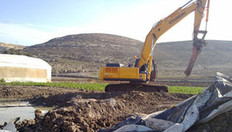
NABLUS, (WAFA) – Israeli forces Thursday demolished several farmers’ residences and agricultural facilities in the Jordan Valley area, according to local residents.
They said that Israeli military demolished four barracks and a residence belonging to a Palestinian family in the area.
Suliman Abdullah, a resident in the area, told WAFA that Israeli bulldozers demolished his house and a number of barracks used as animal barns completely destroying his property.
He said this was the second time Israeli forces had demolished his barn.
Forces also demolished several farmers’ residences in the area of Froosh Beit Dajan, north of the Jordan Valley, the same area where forces in the past several years had demolished several houses, water wells and agricultural springs.
They said that Israeli military demolished four barracks and a residence belonging to a Palestinian family in the area.
Suliman Abdullah, a resident in the area, told WAFA that Israeli bulldozers demolished his house and a number of barracks used as animal barns completely destroying his property.
He said this was the second time Israeli forces had demolished his barn.
Forces also demolished several farmers’ residences in the area of Froosh Beit Dajan, north of the Jordan Valley, the same area where forces in the past several years had demolished several houses, water wells and agricultural springs.
